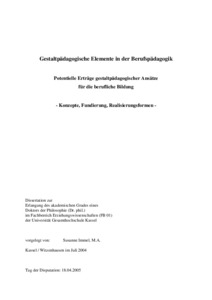| dc.date.accessioned | 2006-03-28T16:01:32Z | |
| dc.date.available | 2005-05-24 | |
| dc.date.issued | 2005-05-24 | |
| dc.identifier.uri | urn:nbn:de:hebis:34-2268 | |
| dc.identifier.uri | http://hdl.handle.net/123456789/2268 | |
| dc.format.extent | 1291207 bytes | |
| dc.format.mimetype | application/pdf | |
| dc.language.iso | ger | |
| dc.rights | Urheberrechtlich geschützt | |
| dc.rights.uri | https://rightsstatements.org/page/InC/1.0/ | |
| dc.subject | Gestaltpädagogik | ger |
| dc.subject | betriebliche Bildung | ger |
| dc.subject | integrative-educational | ger |
| dc.subject | vocational training | ger |
| dc.subject.ddc | 370 | |
| dc.title | Gestaltpädagogische Elemente in der Berufspädagogik. Potentielle Erträge gestaltpädagogischer Ansätze für die berufliche Bildung. Konzepte, Fundierung, Realisierungsformen. | ger |
| dc.type | Dissertation | |
| dcterms.abstract | Gestaltpädagogische Elemente in der Berufspädagogik Potentielle Erträge gestaltpädagogischer Ansätze für die berufliche Bildung - Konzepte, Fundierung, Realisierungsformen - Zusammenfassung: Berufsausbilder, Berufsschullehrer und Trainer in der Aus- und Weiterbildung werden heute mit vielfältigen Veränderungen konfrontiert. Aufgrund des Technikeinsatzes zeigt sich in vie-len Unternehmen ein Wandel der beruflich organisierten Arbeit. Die wirtschaftlichen, techni-schen und sozialen Systemzusammenhänge werden zunehmend komplexer, dynamischer, enger vernetzt und normativ unbestimmter. Die technologische Entwicklung, vor allem der Kommunikationsmedien, hat eine Temposteigerung der Informationsübermittlung zur Folge, die gleichzeitig das Wissen erhöht. Mit der Forderung nach Schlüsselqualifikationen und der Wiederentdeckung ganzheitlicher Arbeitssituationen ist das Bestreben nach Bildungskonzep-ten verbunden, die mit der Herausbildung von Kompetenzen, wie vernetztes, system- und handlungsbezogenes Denken in komplexen Kontexten, Abstraktionsvermögen, systemati-sches Verständnis von Organisationsinterdependenzen, Selbstständigkeit, Selbstverantwor-tung, soziale, methodische und kommunikative Kompetenz und Innovationskraft korrespon-dieren. Unter dem Blickwinkel der Gestaltpädagogik fällt auf, dass die Berufspädagogik Methoden und Techniken in der betrieblichen Aus- und Weiterbildung nutzt, die wesentliche Elemente der Gestaltpädagogik enthalten. Eine konkrete theoretische Fundierung und Einbettung in die Berufspädagogik fehlt jedoch bisher. Die primäre Zielsetzung der Arbeit ist, die theoretischen Grundlagen der Gestaltpädagogik herauszuarbeiten und sie mit der Berufspädagogik in Verbindung zu bringen. An Beispielen wird aufgezeigt, wie gestaltpädagogische Aspekte in die betriebliche Aus- und Weiterbildung einfließen. Dabei werden unter anderem auch die Grenzen und Potentiale der Gestaltpädago-gik für die Berufspädagogik betrachtet. Die theoretische und praktische Relevanz der Arbeit ergibt sich daraus, dass erstmals berufs-pädagogische Vorgehensweisen der Praxis im Hinblick auf gestaltpädagogische Aspekte un-tersucht wurden. Die wesentlichen Forschungsergebnisse dieser Arbeit lassen sich wie folgt zusammenfassen: In der betrieblichen Aus- und Weiterbildung kommen Methoden und Vorgehensweisen zum Einsatz, die oberflächlich betrachtet gestaltpädagogischen Charakter haben. Jedoch werden die gestaltpädagogischen Grundgedanken, wie z.B. eine ganzheitlich umfassende Persönlich-keitsentwicklung, persönlich bedeutsames Lernen, Förderung der sozialen Interaktionsfähig-keit oder die Förderung der Autonomie in der betrieblichen Bildungsarbeit auf ein Minimum reduziert. Die gestaltpädagogischen Methoden und Vorgehensweisen werden überwiegend auf ökonomische Zwecke hin ausgerichtet und funktionalisiert eingesetzt. Man kann sagen, dass sich die betriebliche Praxis mit der Aneinanderreihung von kreativen Übungen zufrieden gibt, und eine Tendenz zu erlebnisaktivierenden Vorgehensweisen zu erkennen ist. | ger |
| dcterms.abstract | Integrative-educational Elements in Vocational Training Potential benefits of an integrative-educational approach for vocational training - Concepts, theoretical foundation, forms of realization - Abstract: Vocational trainers and teachers, and coaches involved in personal development and further education are confronted today with numerous changes. Owing to the use of technology, there has been a fundamental shift in the organization of work. Commercial, technical and social inter-relationships are becoming increasingly complex, dynamic, bound together and less standardized. Technological developments, particularly in the field of communication, have increased the speed of information transfer resulting in an increase of knowledge. Demands for key qualifications and the rediscovery of the holistic workplace have led to a search for educational concepts which can develop skills sets such as the ability to think in terms of networks and systems in complex contexts while retaining a focus on action, the capacity for abstract thought, a systematic understanding of interdependencies within the organization, personal responsibility, social, methodical and communicative skills and innovative powers. In terms of Gestalt theory, it becomes apparent that the methods and techniques used in vocational training and personal development contain key elements of an integrative-educational approach. However, there is currently no specific theoretical foundation for incorporating this approach within vocational training. The primary objective of this dissertation is to elaborate the fundamentals of integrative-education on the basis of Gestalt theory and to incorporate these within vocational training. Examples are used to illustrate how integrative-educational aspects can be incorporated in vocational training and personal development. In doing so, the limitations and potential of integrative education for vocational training are considered. The theoretical and practical relevance of the work is due to the fact that this is the first time the methods used in vocational training in practice have been analyzed from the perspective of Gestalt theory. The main findings of the dissertation can be summarized as follows: The methods and approaches used in the vocational training and further development activities of enterprises are superficially of an integrative-educational nature. However, the core principles of integrative education, such as a holistic approach to personal development, personally significant learning, the promotion of social skills or autonomy in the working environment, are reduced to a minimum. The integrative educational methods and procedures are primarily geared towards economic objectives and applied in a functional way. Although current vocational training practice makes limited use of creative exercises there is a trend towards experiential awareness learning methods. | eng |
| dcterms.accessRights | open access | |
| dcterms.creator | Immel, Susanne | |
| dc.contributor.corporatename | Kassel, Universität, FB 01, Erziehungswissenschaft, Humanwissenschaften | |
| dc.contributor.referee | Burow, Olaf-Axel (Prof. Dr.) | |
| dc.date.examination | 2005-05-18 | |

